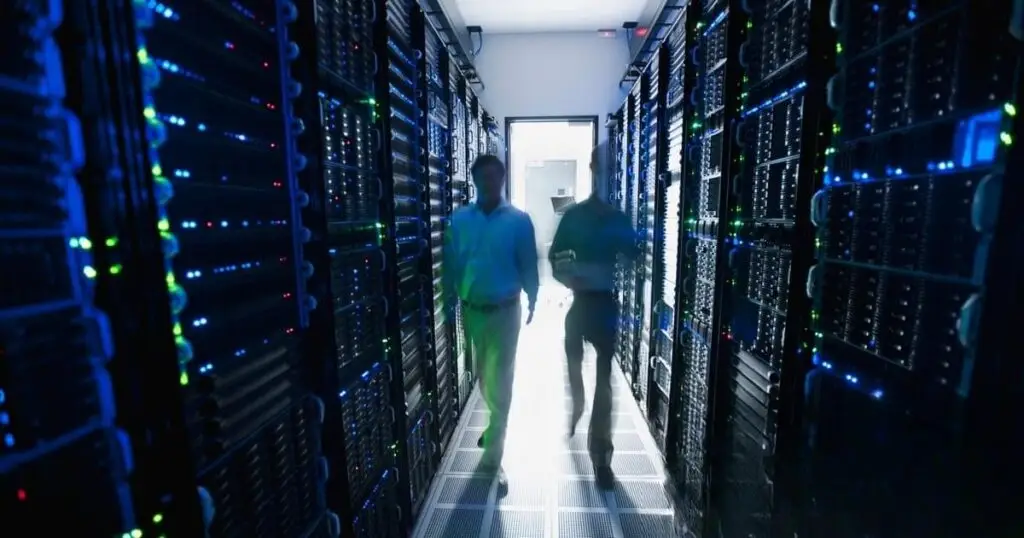In a surprising turn, data centres in Ireland have surpassed the electricity consumption of all urban homes combined, according to recent figures. The country’s burgeoning tech hubs have fueled this increase, with data centres using 21% of Ireland’s electricity in 2023. This marks a significant rise from 2022 and has sparked concerns about the impact on climate targets.
This development is particularly alarming as experts predict that data centres could consume up to 31% of Ireland’s electricity within the next three years. The escalating demand for data processing, driven by advancements in artificial intelligence (AI), threatens to derail both national and European climate goals.
Surge in Data Centre Power Consumption
In 2023, data centres in Ireland used more electricity than all urban homes combined, according to official figures. Data centres supporting tech hubs consumed 21% of Ireland’s electricity, which was a 20% increase from 2022. Urban homes, in contrast, used 18% of the total power supply.
The significant rise in electricity use by data centres marks the first time they have overshadowed the combined consumption of residential areas in towns and cities. This surge has raised concerns that the demand for data processing, particularly driven by artificial intelligence (AI), could jeopardise climate targets both in Ireland and across Europe.
Impact on Climate Targets
Experts warn that if the current trend continues, data centres could consume around 31% of Ireland’s electricity within the next three years. This figure would surpass the combined electricity use of urban and rural homes, which together constituted 28% of overall power demand in 2023.
Such an increase in energy demand from data centres is likely to place added pressure on tech companies to develop their own renewable energy supplies. The unexpected rise in power consumption, largely driven by recent advancements in AI, is becoming a significant hurdle for climate goals.
Tech Companies and Emission Challenges
Tech companies like Google, which has its European headquarters in Ireland, are already facing challenges. Google reported a 48% increase in its overall emissions last year compared to 2019, highlighting the environmental cost of data processing.
The company’s growing reliance on data centres is seen as a potential threat to its green ambitions. With the rise in AI and data needs, tech companies have to balance their operational demands with their environmental commitments, a task easier said than done.
Dependence on Fossil Fuels
Ireland still relies heavily on fossil fuels for electricity. Over 50% of the electricity consumed last year came from fossil fuels, including 45% generated by gas plants and the remaining portion from coal, peat, or oil.
Wind power contributed 34.6% to the electricity grid, while solar power made up a mere 1.2%. This dependency on fossil fuels complicates the country’s efforts to ramp up renewable energy installations swiftly.
Calls for Renewable Energy Development
Professor Paul Deane from University College Cork emphasised the urgency of adopting renewable energy more rapidly. ‘If we already had lots of wind and lots of solar, it wouldn’t be a problem,’ he said. ‘We’re still so reliant on fossil fuels. We need to be able to build up renewables very quickly.’
Despite Ireland’s ability to construct large data centres swiftly, it has not achieved the same efficiency in building renewable energy sources. The gap between renewable energy capacity and data centre power needs is a concern for experts.
Renewables like wind and solar are crucial for balancing the electricity grid. Increasing investments in these energy sources are vital for meeting both current and future power demands sustainably.
Economic Factors Driving Growth
Ireland’s low corporate taxation policy has been a significant factor in attracting tech companies and data centres to the country. This policy has contributed to the rapid expansion of the tech sector, adding to the energy consumption woes.
While the economic benefits of hosting major tech firms are clear, the environmental costs are increasingly hard to ignore. Balancing economic growth with sustainable energy practices is becoming a critical issue for policymakers in Ireland.
The growing tech hub has undoubtedly boosted Ireland’s economy. However, there is an urgent need to address the environmental impact, particularly in the context of global climate targets and local energy sustainability.
Future Projections and Concerns
In the next few years, the demand for data processing is expected to rise further, driven largely by advancements in AI and other technologies. This will likely lead to increased electricity consumption by data centres, intensifying the need for renewable energy sources.
Experts agree that without substantial investments in renewables, Ireland might struggle to meet its energy needs sustainably. The pressure is mounting on both the government and tech companies to collaborate on sustainable solutions.
The balance between technological advancement and environmental sustainability is delicate. Immediate actions are required to ensure that economic growth does not come at the expense of the environment.
The burgeoning demand for data processing in Ireland highlights a critical intersection between technology and sustainability. Immediate action is required to ensure economic and technological growth aligns with environmental preservation.
As data centres continue to expand, investing in renewable energy sources becomes a necessity, not a choice. A balanced approach between tech development and environmental sustainability is crucial for safeguarding future resources and climate targets.
Addressing these challenges head-on will determine whether Ireland can maintain its role as a tech hub without compromising its environmental commitments. The pressure is on not only the government but also tech companies to take meaningful steps towards a greener future.

